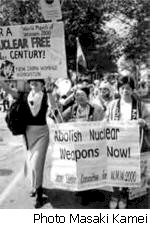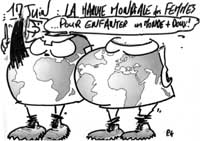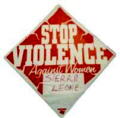Peace is a priority in Sri Lanka and Bolivia, where women oppose militarization, and in Cameroon, Congo Brazzaville, Iraq, Mexico, Niger, Panama, Romania, Yugoslavia, Ukraine, Sierra Leone, and Turkey.
"Our position is one of peace. We have shed enough tears, bitter tears. We are tired of swallowing them. We are tired of crying for our children, our brothers and our husbands. As women we are happy to have given life to you men, but as creators of life we are also ready to shed our blood in its defence. Conflicts in Chad have always been the affair of men, and you are to blame for the lives lost because you are unaware of the value of life," said a representative of a women's peace group during the World March launch on March 11, 2000, in N'Djamena, Chad.
In Rwanda, Burundi and Congo Kinshasa, women demanded to participate in the peace negotiations. In Samoa, they wanted to be "at the heart of the reconstruction and reconciliation process."
In most countries, women called for education to encourage non-violent behaviour, based on principles of tolerance, peace and respect for diversity (Barbados, Chile, Nicaragua, Peru, Tunisia, Yugoslavia, Romania, Ukraine, Venezuela).

Japanese women were passionate in their demand to abolish nuclear weapons and prevent the passage of war legislation. They called for the dismantling of U.S. military bases in Okinawa where women have been violently attacked by soldiers stationed there.
Women from the Great Lakes region in Africa, the Arab world, and Kurdistan demanded the cessation "of the arms trade, including nuclear, conventional, chemical, biological weapons and land mines."
Women in industrialized countries followed suit by urging rich countries to stop selling arms to poor countries.







